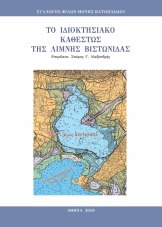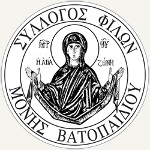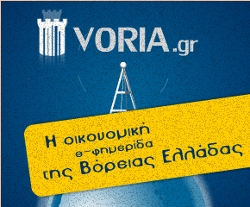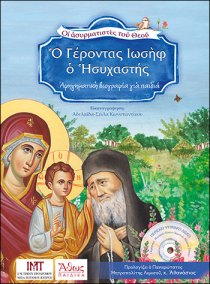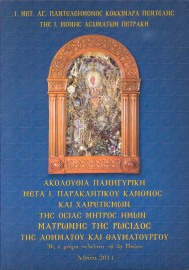
Information for pilgrims to Mount Athos
16 Ιουνίου, 2012 — vatopaidifriend4Holy Executive
οf the Holy Mount Athos
Pilgrims’ bureau
Mount Athos, known in Greek as Ago Oros (Hholy Mountain), is a peninsula in Halkidiki, Northern Greece. This sacred area contains twenty monasteries including one Serbian, one Bulgarian and one Russian. Although the peninsula of Athos is part of Greece, it enjoys certain autonomy. The «Holy Community» under the Ecumenical Patriarchate of Istanbul administrates the region. This administrative body is composed of representatives of the monasteries and maintains an office at Karyes (Iera Epistasia) where all visitors register upon arrival at Mount Athos. Διαβάστε τη συνέχεια του άρθρου »
Maurice Banjoko – ‘How I became Orthodox’
9 Ιουνίου, 2012 — vatopaidifriend4Maurice Banjoko from Nigeria, Investment Consultant, in his interview with Pemptousia talks about how he became Orthodox. Δείτε το βίντεο:
Holy Martyrs of Vilnius Anthony,John and Eustachy
15 Μαΐου, 2012 — vatopaidifriend4Holy Martyrs of Vilnius
The Holy Martyrs Anthony, John, and Eustachy were martyred for the faith at the time of Olgerd, Grand Duke of Lithuania, about the year 1347.
Anthony and John were courtiers of the Grand Duke and, like most of the Lithuanian population at that time, pagans. The Holy Brothers were secretly baptised by orthodox priest Nestor.
They began living a Christian life and refused to follow the pagan practices. Once at a feast, when the Duke offered them to eat flesh on a fasting day (on Friday, on the eve of Christmas), Anthony and John refused, and they were therefore thrown into a dungeon. Διαβάστε τη συνέχεια του άρθρου »
Christ is Risen! Indeed He is risen!
14 Απριλίου, 2012 — vatopaidifriend3English: Christ is Risen! Indeed He is risen!
Aleut: Khristus anahgrecum! Alhecum anahgrecum!
Alutuq: Khris-tusaq ung-uixtuq! Pijii-nuq ung-uixtuq!
Amharic: Kristos tenestwal! Bergit tenestwal!
Anglo-Saxon: Crist aras! Crist sodhlice aras!
Arabic: El Messieh kahm! Hakken kahm!
Armenian: Kristos haryav ee merelotz! Orhnial eh harootyunuh kristosee!
Aroman: Hristolu unghia! Daleehira unghia!
Athabascan: Xristosi banuytashtch’ey! Gheli banuytashtch’ey!
Bulgarian: Hristos voskrese! Vo istina voskrese!
Byelorussian: Khrystos uvaskros! Sapraudy uvaskros!
Chinese: Helisituosi fuhuole! Queshi fuhuole!
Coptic: Christos anesti! Alithos anesti!
Czech: Kristus vstal a mrtvych! Opravdi vstoupil!
Danish: Kristus er opstanden! I sandhed Han er Opstanden!
More…
Greetings to the International Conference on Saint Gregory Palamas Thessaloniki 7-12 March 2012 from the Abbot of the Holy Great Monastery of Vatopaidi, Archimandrite Ephraim
9 Μαρτίου, 2012 — VatopaidiFriend 6The Supreme Ecclesiastic Academy of Thessaloniki in collaboration with the Patriarchic Foundation of Pateric Studies, the English Cambridge Institute of Orthodox Christian Studies, the Metropolis of Thessaloniki together with other Metropolis and other sectors organize an International Scientific Convention from the 7th until the 15th of March 2012, on the subject: « Saint Gregory Palamas “ The Theological and Philosophical meaning of his work” »
The reverend archimandrite Ephraim, Elder and the Abbot of the Holy Great Monastery of Vatopedi has sent his greetings that were addressed to the commencement of the Convention and we are addressing you subsequently.
The Holy Monastery of Mikrokastro has bid farewell to nun Erini
9 Μαρτίου, 2012 — VatopaidiFriend 6Μετάφραση για την Romfea.gr, Όλγα Κοκκίνου
The Holy Monastery of the Dormition of the Mother of God at Mikrokastro has bid its farewell to nun Erini who reposed to our true, heavenly realm, the Heavenly Jerusalem; death for Christians is none other than dormition and transposition to the true life.
The Mtropolitan of Sisaniou and Siatistis, Paul, along with the Metropolitans of Kastoria and Florinis, Serapheim and Theokleitos and the Bishop of Thermon, Demitirus officiated at the funeral, while numerous priests, monks and nuns poured in from all over Greece.
Private club?
8 Μαρτίου, 2012 — VatopaidiFriend 6Sts Cyril and Methodius
We must invite our friends and neighbors to “taste and see” the great treasure that is Orthodoxy, for it is our responsibility, as Christians, to reach out in kindness, and with a welcoming smile, when we see strangers enter our temples.
Two Byzantine brothers, Saints Cyril and Methodius, brought Orthodox Christianity to the Slavs in the ninth century. The brilliance of Eastern Orthodox missionary outreach, as opposed to that of the Latin Church, was in the very use of the vernacular. These great saints who became known as the Apostles to the Slavs, left the Slavs with a liturgical language that was understandable to them. The services were not imparted in the Greek language, as though it alone was sacred enough to be used in Divine Worship, but helped them understand their new faith by worshiping in their own language.
Saudis Pressure Christian Prisoners to Convert to Islam
10 Φεβρουαρίου, 2012 — vatopaidifriend4Saudi Arabian officials sent a Muslim preacher to pressure Christian prisoners into converting to Islam, according to International Christian Concern (ICC).
Saudi Arabia arrested 29 Christian women and six Christian men, all Ethiopian citizens, on Dec. 15 after they held a prayer meeting in Jeddah.
“The Muslim preacher vilified Christianity, denigrated the Bible and told us that Islam is the only true religion. The preacher told us to convert to Islam. When the preacher asked us, we didn’t deny about our Christian faith. I was so offended with her false teachings that I left the meeting,” said one of the female prisoners who spoke to ICC in a telephone interview from Briman jail in Jeddah. Διαβάστε τη συνέχεια του άρθρου »
Educational reform – Is it for the person or the labour market?
20 Δεκεμβρίου, 2011 — ZpapThe Hagiorite Orthodox monasticism is not isolated from the world; it is not unsociable. On the contrary, one might say that the genuine monk is more sociable than the laity, since he directly communicates with the supreme social Being, the Creator of man and society: the Lord. As hagiorite monks we ache and worry about the future of man theses days. Many discontented people visit the Holy Mountain, distraught by impossible troubles which cause a deadlock. The wrong way of living is the main culprit for all the hardships; that is, life outside the Church.
Our times are such that everything surrounding us and our values is going through a crisis. Scientific and technological advances affect our social lives; consumerism, hedonism, the ideological chaos and the abundance and confusion of theories as well as globalization indicate that modern man finds himself at a crucial turning point in his history.
Under these circumstances, it is very difficult even for a thoughtful adult to have a clear cut idea of his status and recognize what his truly personal options are without being swayed by other factors or to understand where he can move freely and how he is being dominated by something or someone. If this is tricky for a mature person imagine how complicated it is for a student or a pupil, who also have to deal with their hitherto unrecognizable fits and starts at an age when they ought to establish their personalities and create their own identity! Διαβάστε τη συνέχεια του άρθρου »
Creation· the end of ages (part 2)
14 Δεκεμβρίου, 2011 — ZpapThe greatest ecological disaster described in the Scriptures is the flood during Noah’s times; it took place because “the wickedness of man was great in the earth, and that every intention of the thoughts of his heart was only evil continually” (Genesis 6, 5). Man rebelled absolutely against God and against anything which had to do with his spiritual existence. Because of the prevailing wickedness those days, which was the result of man abusing his freedom, the Lord is forced to say: “My Spirit shall not abide in man forever, for he is flesh” (Genesis 6, 3).
By ‘flesh’ it is meant ‘man’s carnal attitude, his beastly and full of passions life’. Thus the flood was not imposed by the Lord as a punishment but was caused by the comprehensive rebellion of mankind. There is a similar situation in the case of Sodom and Gomorra. In the conversation between Abraham and God, it is revealed that not even ten righteous people could be found in these cities, which would have aborted their destruction (Genesis 18, 20-33). However, in the case of Nineveh, peoples’ repentance annulled the city’s destruction (Jonah 3, 10). That is, man’s good intention cooperates with God’s will to shape history. The Lord is not the Judge, the Critic. We must not view the Lord through the prism of legal justice. Διαβάστε τη συνέχεια του άρθρου »
Creation· the end of ages (part 1)
13 Δεκεμβρίου, 2011 — ZpapMan has been trying to make sense of the creation ever since antiquity as it is manifested in the teachings of many religions and philosophies. Generally, we may say that ancient Greek philosophers have offered three explanations as to the creation of the world: a) the Stoics and the Epicureans advocated that the world was self-existent, autonomous and eternal, b) The Pythagoreans argued that the physical elements and laws were divine and c) The Aristotelians attributed the cause of the creation to a god “who was the first mover, unmoved”. We may also argue that all subsequent theories, whether hailing from scientific or philosophical/religious circles, are divided into the following three main categories: the materialists, the pantheists and the theocrats.
However, we derive from the Scriptures definite proof that God created the entire physical and non-material world not from previously existent matter but “from what was not” (Maccabeus 7, 28) and that the Lord lives in the world (see psalms 138, 7-10) and He is not an unmoved being. These are the basic dogmas of our Church. Word-God created every living being: “All things were made through him, and without him was not anything made that was made” (John 1, 3). The creation of the world from nothing does not mean that that which was created subsequently becomes autonomous and independent. It means that God and the world are two different entities which are connected with unbreakable bonds. The uncreated Lord is the only uncreated cause and the world is the created outcome. When the Lord said “Let it be light” and “it was so” or when He said “let there be lights in the expanse of the heavens” and “ it was so” or when He finally created everything that was made “and it was very good” He did not withdraw from the world ( see Genesis 1, 3-31). Διαβάστε τη συνέχεια του άρθρου »
Discourse on Mount Athos, Prologuue (Elder Joseph of Vatopaidi)
24 Νοεμβρίου, 2011 — ZpapPROLOGUE
Silence for the monks is a rule of life. It protects them from uncontrollable and unrestrained talk as well as from impugnation and slander, which result in the death of the soul. It delivers them from wrangle and strife and preserves in them internal peace which is necessary for inwardness. Silence is the fruit of quietude, an internal state which gives birth to spiritual discourse.
read more…
The Kollyvades Movement and its Significance
14 Νοεμβρίου, 2011 — ZpapThe great teachers of the Church and of the Greek nation, Makarios Notaras, Nikodemos of the Holy Mountain and Athanasios of Paros, who lived and worked in the 18th and early 19th centuries, form a new trinity of shining lights of the Church, like the three Fathers of the Church in the past, relatively speaking of course and bearing in mind the historical circumstances they lived through with their similarities and differences. To these three must be added Neophytos of Kafsokalyvia, who started the movement, although he was not as important or active as the other three would later become, thus earning their place in the Communion of Saints. They were nicknamed Kollyvades by their opponents on the Holy Mountain because they objected to the transfer of the memorial services (involving kollyva) from Saturday to Sunday in defiance of tradition, rightly judging that services for the dead are incompatible with the resurrectional and festal nature of Sunday. Διαβάστε τη συνέχεια του άρθρου »
Divine Healing Has its Price Tag
10 Νοεμβρίου, 2011 — ZpapWe appeal to God for the healing of our souls and bodies only as a last resort. God’s healing is always a miraculous act, and we are afraid of facing the manifestation of the almighty power of God. Although the healing we receive from God is a gift, we also know that its implications are many and everlasting.
There is a price tag on divine healing, and the price is a complete change of life. It is indeed a serious price – for change does not come easily. For this reason, divine healing can only take place when it is really wanted. It also requires a total submission and a full commitment to the relationship of faith with God’s divine power.
In order to understand this process, we can look closely at the healing performed by our Lord, Jesus Christ at the pool called Bethesda by the Sheep Gate in Jerusalem. An angel of the Lord would come down at a certain time and stir the waters of the pool. Then, “whoever stepped in first, after the stirring of the water, was made well of whatever disease he had” (John 5:4). Διαβάστε τη συνέχεια του άρθρου »
Seeing the wood fot the trees, Christianity and the ecological crisis
9 Νοεμβρίου, 2011 — ZpapIn recent times, the ecological crisis has been brought increasingly to our attention. Scientists, the media, Hollywood, thrash metal bands, and a horde of environmentalists from politicians to tree-hugging hippies and pseudo-Buddhists, have all had their say. But there is one voice on environmental issues that seems to only speak in hushed tones, and this is the voice of Christianity. Some people claim that Christianity, far from being concerned about environmental issues, is the prime culprit for the ecological crisis. These people point to the creation of the first human beings in the book of Genesis, where God says to the first-formed: “…fill the earth and subdue it; and have dominion over the fish of the sea and over the birds of the air and over every living thing that moves upon the earth”. The Christian religion, so these people claim, has given humanity not only the freedom, but also the command, to do as he pleases with the natural environment. Two rebuttals to this view should be made. First of all, it seems odd that it is only Christianity that is picked out as the scapegoat, given it is the Old Testament that is used as the basis for the criticism. Why not blame Judaism as well? Perhaps that would just be too politically incorrect. Διαβάστε τη συνέχεια του άρθρου »
Scientists create brain-like, massively parallel computer from molecules
31 Οκτωβρίου, 2011 — vatopaidifriend3 If you thought that Japan was merely the master of miniaturization, tentacles, and creepy robots, think again: A group of Japanese scientists have built a massively-parallel, brain-like computer out of an organic molecule called DDQ. This computer, which is built from 300 DDQ “neurons,” has successfully calculated how heat diffuses through a medium, and the mutation of normal cells into cancer cells…
If you thought that Japan was merely the master of miniaturization, tentacles, and creepy robots, think again: A group of Japanese scientists have built a massively-parallel, brain-like computer out of an organic molecule called DDQ. This computer, which is built from 300 DDQ “neurons,” has successfully calculated how heat diffuses through a medium, and the mutation of normal cells into cancer cells…
The schedule of visits of the Holy Belt of Theotokos in Russia
21 Οκτωβρίου, 2011 — ZpapThe Holy Belt of Theotokos has been scheduled to travel through the cities of Russia, in such a way that it will be formed the sign of a cross in the four directions of the horizon.
Millions of Russians are waiting with desire and reverence to worship the Holy Belt. The Prime Minister Putin attended the welcoming reception of the Holy Belt with high honors in St. Petersburg.
Gaddafi killed as Libya’s revolt takes hometown
20 Οκτωβρίου, 2011 — Zpap
An anti-Gaddafi fighter points at the drain where Muammar Gaddafi was hiding before he was captured in Sirte October 20, 2011. REUTERS/Thaier al-Sudani
Muammar Gaddafi is dead, Libya’s new leaders said, killed by fighters who overran his home town and final bastion on Thursday. His bloodied body was stripped and displayed around the world from cellphone video.
Senior officials in the interim government, which ended his 42-year rule two months ago but had labored to subdue thousands of diehard loyalists, said his death would allow a declaration of «liberation» after eight months of bloodshed.
50+ Photos from the Feast of Humbleness – 50+ Φωτογραφίες από την γιορτή της ταπεινώσεως
19 Οκτωβρίου, 2011 — vatopaidifriend3 The Feast of Saint Evdokimos – the feast of humbliness
The Feast of Saint Evdokimos – the feast of humbliness
Sărbătoarea Sfântului Evdokim – sărbătoarea smereniei
Η γιορτή του Αγίου Ευδοκίμου – η γιορτή της ταπεινώσεως
English
In the cycle «Spiritual Picture of the Day» we will offer a small glimpse from the feast of Saint Evdokimos which ended a while ago. It is the feast of the humbleness, the feast of the power to wish to remain unknown.
Saint Evdokimos is an unknown saint found in the Vatopaidi’s ossuary in 1840, during some reconstruction works. He was found by the beautiful fragrance of his holy relics. He was found dead in a prayer position with an icon of Virgin Mary on his chest. Judging from his clothes, he was dead 100 – 150 years before. From then, the saint does many miracles to the ones who pray to him.
..but besides that, there is a very important aspect: he knew that he will die and he went away from the glory of the humans to be with God. Only with God. And God accepted him.
Nowadays, we do exactly the opposite: we go away from the true glory which came only from God and hunt the vain glory that comes from humans – soap bubbles which is several seconds disappear in the thin air.
Perhaps God urges us to bend our knees in front of the virtue of humbleness of this unknown saint and ask for his help, in order to show us that we are in the wrong way.
See the photos to convince for yourself.
Romanian
În ciclul „Fotografia Duhovnicească a Zilei” vă oferim o mică privire din sărbătoarea Sfântului Evdokim ce s-a terminat cu puțin timp în urmă. Este sărbătoarea smereniei, sărbătoarea puterii de a rămâne necunoscut.
Sfântul Evdokim este un sfânt necuonscut găsit în osuarul Mănăstirii Vatoped în 1840, în timpul unor lucrări de reconstrucție. Sfântul a fost găsit datorită miresmei extraordinare a sfintelor sale moaște. A fost găsit mort, în poziție de rugăciune cu icoana Maicii Domnului pe piept. Judecând după hainele sale, sfântul a adormit întru Domnul în urmă cu 100 – 150 de ani. De atunci, sfântul face multe minuni celor ce i se roagă.
…însă dincolo de asta, lucrul cel mai important este faptul că el știa că va muri și a plecat departe de slava oamenilor pentru a fi cu Dumnezeu. Numai cu Dumnezeu. Și Dumnezeu l-a primit.
Astăzi, noi facem exact contrarul: ne îndepărtăm de slava cea adevărată care vine de la Dumnezeu și vânăm slava deșartă care vine de la oameni – bule de săpun care dispar în câteva secunde…
Poate că Dumnezeu ne îndeamnă să îngenunchem în fața smereniei acestui sfânt necunoscut și să-i cerem ajutorul cu scopul de a ne arăta că suntem pe un drum greșit.
Vedeți fotografiile ca să vă convingeți singuri.
Greek
Στην σειρά των «Πνευματικών φωτογραφιών της ημέρας» σας δίνουμε τη δυνατότητα να δείτε κάτι από την γιορτή του αγίου Ευδόκιμου που τελείωσε πριν από λίγο. Είναι η γιορτή της ταπεινότητας, η γιορτή της δύναμης να ευχόμαστε να παραμένουμε άγνωστοι.
Ο άγιος Ευδόκιμος είναι ένας άγνωστος άγιος που βρέθηκε στο οστεοφυλάκιο του Βατοπαιδίου το 1840 κατά την διάρκεια εργασιών ανακατασκευής. Βρέθηκε χάρη στην ευωδία που ανέδιδαν τα άγια λείψανα του. Όταν τον βρήκαν, ήταν σε γονατιστή στάση προσευχής κρατώντας μια εικόνα της Παναγίας στο στήθος του. Κρίνοντας από τα ρούχα του, είχε κοιμηθεί πριν από 100-150 χρόνια. Από τότε, ο άγιος επιτελεί πολλά θαύματα σε αυτούς που προσεύχονται σε αυτόν.
Όμως εκτός από αυτό, το σημαντικότερο είναι ότι ήξερε ότι θα αποδημήσει εν Κυρίω και απομακρύνθηκε από την «δόξα» του κόσμου, για να είναι κοντά στον Θεό. Μόνος με τον Θεό. Και Εκείνος τον δέχτηκε κοντά Του.
Σήμερα κάνουμε ακριβώς το αντίθετο: Απομακρυνόμαστε από την αληθινή δόξα που προέρχεται μόνο από τον Θεό και κυνηγούμε την εφήμερη ανθρώπινη «δόξα» – σαπουνόφουσκες που σκάνε σε μερικά δευτερόλεπτα…
Ίσως ο Θεός μας προτρέπει να λυγίσουμε τα γόνατά μας μπροστά στην αρετή της ταπεινοφροσύνης του αγίου και να ζητάμε την βοήθειά του για να μας δείξει ότι είμαστε στον λάθος δρόμο.
Δειτε τις φωτογραφίες για να πειστήτε μόνοι σας.
St Frideswide of Oxford
19 Οκτωβρίου, 2011 — vatopaidifriend3Some years ago there was a young student in Oxford who felt that he had lost his way. Seated in a famous library with a pile of books before him, he closed his eyes and began to pray for guidance. When he opened them, he found himself looking at the Latin motto of that University, inscribed on the library ceiling: ‘Dominus Illuminatio Mea’ – the Lord is my Light. At once the young man arose from his seat, returned his books, walked out of the library, mounted his bicycle and headed for Binsey.
Two miles from the hustle and bustle of the centre of the City of Oxford, there stands a little mediæval chapel and a holy well. This oasis of peace and sense is Binsey Chapel and the holy well of the Patroness of Oxford, St Frideswide.
Saint Gall
16 Οκτωβρίου, 2011 — vatopaidifriend3SAINT GALL – Gallus (or Gall) was born in the year 550, just eight years before Saint Comgall founded his famous monastery at Bangor. Little is known of the boyhood of Gall except that it is generally thought that he showed great piety and interest in the Christian faith. As a young man he went to study under Comgall of Bangor. And here it should be noted that the monastery at Bangor (image of ruins, below) had become renowned throughout Europe as a great centre of Christian learning. Because of the great learning at Bangor, Ireland became known as «the land of Saints and Scholars». Missionaries went out from Bangor Abbey to all parts of Ireland, the British Isles, and the Continent.
The Old Byzantine Tower – Ο παλιός Βυζαντινός πύργος (Photoreport)
14 Οκτωβρίου, 2011 — vatopaidifriend3English
The photo report for this week depicts the byzantine tower of Kolitsou which is the last remnant from an old italian Athonite monastery called the monastery of Kaletzes. The monastery was abandoned after the Great Schisma and the tower, one of the finest example of Byzantine towers, entered in the possesion of Vatopaidi.
The later construction phase may date to the second half of 14th century, when John Cantacuzene ordered the building (or repair) of the tower.
See all the photos here.
Romanian
Fotoreportajul din această săptămână are ca subiect turnul bizantin de la Colciu care este ultima rămășiță dintr-o veche mănăstire italiană Atonită numită Μănăstirea Kaletzi. Mănăstirea a fost abandonată după Marea Schismă și turnul, una dintre cele mai frumoase exemple de turnuri bizantine, a intrat în posesiunea Mănăstirii Vatoped. Ultima etapă în construcția turnului este datată în a doua jumătate a sec. XIV, când Ioan Cantacuzino a poruncit reconstrucția (sau repararea) turnului.
Găsiți toate fotografiile aici.
Greek
Το φωτορεπορτάζ για αυτή την εβδομάδα αφορά τον Βυζαντινό πύργο της Κολιτσούπου αποτελεί τη τελευταία ανάμνηση από ένα παλαιό Ιταλικό Αθωνικό μοναστήρι με το όνομα Μονή του Καλετζή. Η μονή, εγκαταλείφθηκε ύστερα από το σχίσμα των Εκκλησιών και ο πύργος, ένα από τα ωραιότερα παραδείγματα Βυζαντινών πύργων, πέρασε στην κατοχή της Μονής Βατοπαιδίου. Η τελική κατασκευαστική φάση, χρονολογείται στο δεύτερο μισό του 14ου αιώνα, όταν ο Ιωάννης ο Κατακουζηνός διέταξε την κατασκευή (ή αναστήλωση) του πύργου…
Θα δείτε όλες τις φωτογραφίες εδώ.
Venerable Parasceva the New
14 Οκτωβρίου, 2011 — vatopaidifriend3Saint Paraskeva the New was born into a pious family, living during the eleventh century in the village of Epivato, between Silistra and Constantinople. Her older brother Euthymius became a monk, and later he was consecrated as Bishop of Matidia. One day, while attending the divine services, the words of the Lord pierced her heart like an arrow, «If any man will come after Me, let him deny himself» (Mt. 16:24). From that time she began to distribute her clothing to the needy, for which reason she endured much grief from her family.
Upon the death of her parents, the saint was tonsured into monasticism at the age of fifteen. She withdrew to the Jordanian desert where she lived the ascetic life until she reached the age of twenty-five. An angel of the Lord ordered her to return to her homeland, so she stayed at Epivato for two years.
Turning Fear Into Faith
14 Οκτωβρίου, 2011 — vatopaidifriend3That ugly and omnipresent thorn called worry! Since it’s a chronic, recurrent condition, it’s been called the “Worry Disease.” I think worry must be Satan’s best weapon against man. Our minds are incessantly preoccupied with our daily cares. During peace-filled, “quiet time” moments of prayer and reflection we confidently profess our faith to God and feel His peace. Yet, this is so often immediately forgotten, preempted by the next worrisome preoccupation. At time, it’s maddening! Too often our “old nature” chooses to worry rather than to trust God. Worry is a sin because we aren’t taking God at his Word.
Spiritual Picture of the Day (S.P.O.D) – Πνευματική Φωτογραφία της Ημέρας (Π.Φ.Η.) (24)
13 Οκτωβρίου, 2011 — vatopaidifriend3English
Yes, working hard together is a source of joy. Working hard together means practical love, and this brings God’s grace in a very practical way. The one who has this experience is a happy man.
But unfortunatelly we don’t have the courage to serve others, to try to love others…See photo…
Romanian
Da, a lucra împreună din greu e o sursă de bucurie. A lucra împreună înseamnă dragoste practică și aceasta aduce harul lui Dumnezeu într-un mod foarte concret. Cel care are această experiență este un om fericit.
Însă din păcate nu avem curajul să-i slujim pe ceilalți, să încercăm să-i iubim pe ceilalți.

Greek
Δυστυχώς όμως δεν έχουμε το θάρρος να θέτουμε τον εαυτό μας στην υπηρεσία, στη διακονία των άλλων, να αγαπάμε τους άλλους….Ναι, το να δουλεύεις σκληρά, είναι αιτία χαράς. Το να δουλεύεις σκληρά μαζί με κάποιον είναι δείγμα έμπρακτης αγάπης και αυτό φέρνει αισθητά την χάρη του Θεού. Αυτός που έχει αυτή την εμπειρία είναι ευτυχισμένος. Διαβάστε τη συνέχεια του άρθρου »
Δυστυχώς όμως δεν έχουμε το θάρρος να θέτουμε τον εαυτό μας στην υπηρεσία, στη διακονία των άλλων, να αγαπάμε τους άλλους….Ναι, το να δουλεύεις σκληρά, είναι αιτία χαράς. Το να δουλεύεις σκληρά μαζί με κάποιον είναι δείγμα έμπρακτης αγάπης και αυτό φέρνει αισθητά την χάρη του Θεού. Αυτός που έχει αυτή την εμπειρία είναι ευτυχισμένος. Διαβάστε τη συνέχεια του άρθρου »
